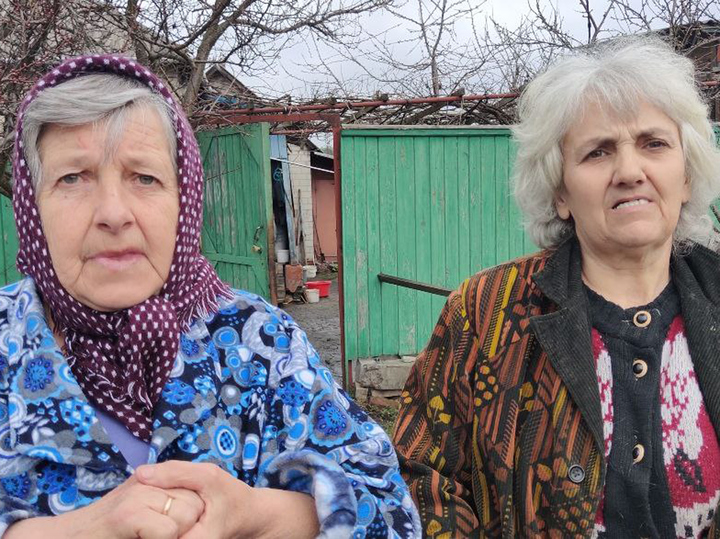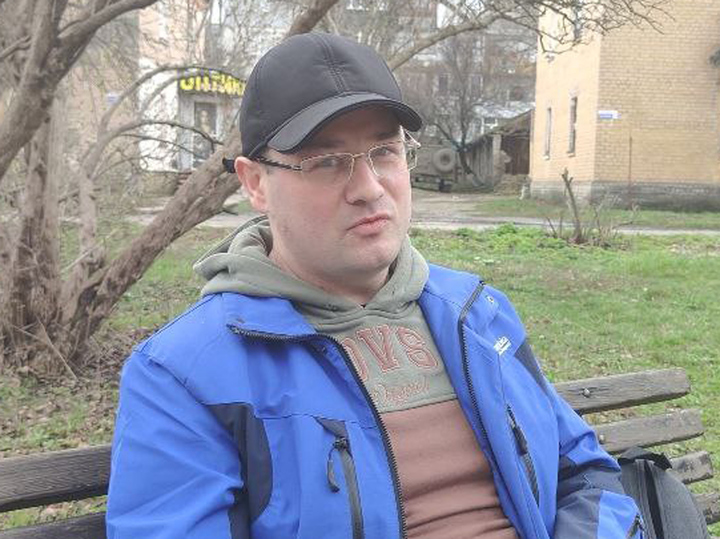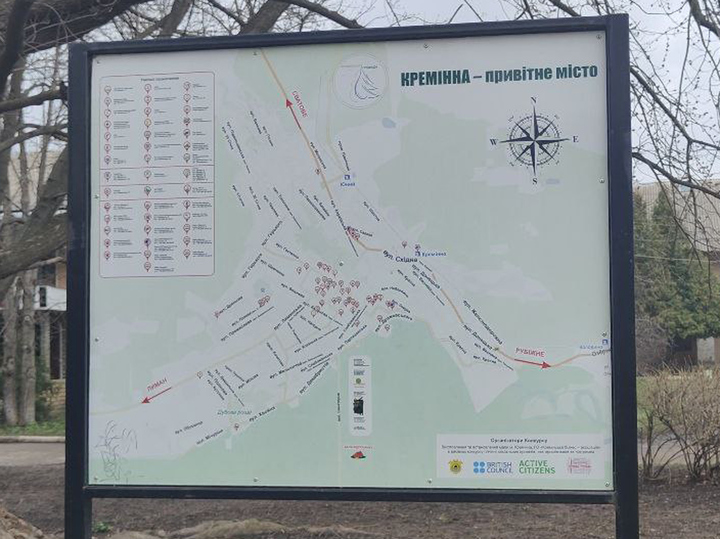Without money and help: residents of Kremennaya spoke piercingly about life at the front line
[ad_1]
I was offered a look at the life of the inhabitants of the Kremensky district, where fighting had recently taken place, by a colleague Bella, a journalist from one of the capital’s publications. Not so long ago, having arrived on a business trip to the NWO zone, she traveled approximately the same route and was shocked by the fact that people often did not even have bread. I wanted to see what had changed after our troops moved the Armed Forces of Ukraine tens of kilometers away from the city.
– First, let’s drop by Staraya Krasnyanka. A married couple lives here, pensioners, I visited them last time, ”Bella said on the way.
The streets of the village are empty, only in the distance are the silhouettes of the military crowded near the truck.
Bella confidently walked forward, it was clear that she knew the way. I stopped near a small whitewashed house. An elderly woman opened the door to a knock, immediately recognized Bella and rushed to hug her, as if it were not a journalist who had come to visit, but her own granddaughter.

– Let’s go to the house. Oh, we didn’t expect guests. We only have potatoes with lard, – the grandmother began to fuss.
“We’ll be here for a minute,” Bella tried to calm the old woman, but the hostess had already rushed to the kitchen, from where she came out a couple of minutes later with jacket potatoes steaming on a plate. I had to take off my shoes and go to the room.
The owner of the house was no less friendly and kept saying: it’s good that we came. Bella asked the old people if they had received humanitarian aid since her last visit. The answer is negative.
“But don’t think we live well,” the hostess hastened to add. – Here the soldiers gave us cereals, sugar. And they pay us a pension, we go to the store …
Out of courtesy, we had to eat potatoes, after which we were still able to convince the couple that it was time for us to go.
The breakup dragged on. Pensioners, apparently, really wanted to share their experiences. On the street, other villagers began to approach us. They recalled that until December last year, they had no other opportunity to cook food or heat it up, except on a fire.
Now the situation is a little better. The gas supply has resumed, but with electricity and water, everything is also sad. You have to buy groceries in the only working store or go to the city. But this, of course, can only be afforded by those who have money and transport. The rest are interrupted by the remnants of the old stocks and what the military will give.
– They said that thirty tons of humanitarian aid had been brought to Kremennaya. And where is she? – one of the local residents Tatyana makes a helpless gesture. – Nothing came to us.
Another acute problem is the lack of medical care. There is no polyclinic, not even the simplest first-aid post in the village. Doctors from the city do not want to go to a troubled place. It turns out that if you get sick – look for an opportunity to get to the doctors on your own.
– My thyroid gland has been removed, special preparations are needed, – Tatyana shares. – I begged a neighbor with a car to take me to Kremennaya, and they say: “We don’t have such a medicine.” We must go to Starobilsk or Lugansk. But I don’t have that option…
“They didn’t pay money, we refuel the tractor for ours”
The next settlement on our trip is the city of Kremennaya itself. It so happened that I often happened to be on the outskirts of the city, but the center was to be seen for the first time. We stopped next to the pedestrian zone. There are battered houses on both sides, in the middle, by some miracle, a public garden with wrought-iron benches that survived by some miracle. It must have been very nice here. Of the walkers – only the military, apparently, who came here from their positions to rest.
– How is life in the city? – finally, we noticed the first civilian who was not in a hurry.
A young man in a blue sports jacket introduced himself as Alexei.
– Yes, we live somehow. Who wants to work. At the very least, you can feed yourself.
– And who can work in military conditions?
– Yes, by anyone. The most demanded profession now is a salesperson. There are many soldiers in the city, trade is flourishing.
According to the city dweller, until recently, food prices were simply exorbitant. It was very difficult to survive, especially for pensioners. But now steel prices have already fallen by thirty percent. What everyone is inexpressibly happy about.

There are enough everyday problems, especially with electricity in the city. It happens that sometimes a current is supplied, but this happens extremely rarely. The April anomalous snowfall only aggravated the situation…
A group of men, apparently utility workers, were picking up last year’s leaves and throwing them into the back of a tractor. We decided to ask them about life in the front-line city.
The reaction surprised. Our request was not received in a friendly manner. To begin with, they demanded to remove the phones and not to remove them even from the back. A little later, however, they explained that this was due to relatives living on the territory of Ukraine.
“We are already considered enemies there, and if they see that we are still communicating with journalists, then in general,” one of them explained, clearly annoyed.
– What do you want to know? one of the men suddenly asked. – How do we live? We live badly. Don’t you see yourself? The city is broken, there are no jobs, no benefits.
He was clearly on edge, and I did not want to cross the line, after which he would break into a scream.
– Well, do you work?
– We work, more precisely – we go out of habit. They never paid money, they say: wait. So you also have to refuel the tractor for your own.
– Why do you come then?
– Yes, because if we do not go, then someone else will be taken to this place – and that’s it. And it’s hard to find a job right now. So we come in the hope that they will start paying soon.
– Girls, go better, – another worker turned to us. There is nothing more to tell us…
Unfortunately, it was not possible to meet with the local authorities. It’s a pity. Of course, there are many questions for them.
“They don’t give humanitarian aid, we eat only potatoes”
The final point of our trip to the liberated territories was to be a visit to the military priest. However, apart from the name of the village near which, as they explained to us, the priest lives, we did not know anything else. And so we decided to get to the village and then ask the locals. Someone must know that a priest is far from the last figure for the villagers.
Already at the entrance to the village, the road was blocked by a huge puddle, impassable for a car. We went on foot.

Near the brown metal fence they saw a little girl in a lilac coat and a funny pink hat with pom-poms that looked like ears.
– Wow, there are still children left, – we were surprised in a voice.
Following the crumbs, a pensioner came out of the gate.
– Do you know where Father Vasily lives? – asked the woman.
The baby cautiously pressed herself against her grandmother’s legs as soon as we got closer.
– No, it definitely doesn’t affect our vulytsi. Do not be afraid, my little bird, – she stroked the girl on the head.
We started talking. Maria Fedorovna, that’s the name of the pensioner – 83. She lives in a village with her daughter, son-in-law, eldest grandson and one and a half year old granddaughter Alina.
– How did you and your child survive when the fighting was going on?
– Yes, yak? It was terrible, – grandmother almost burst into tears, remembering that time. – Vono bangs, the child screams. And what about robots? Even swaddle nem in scho bulo.
– And now how?
– It’s hard, – Maria Fedorovna sighs. – There is no work, no pennies. My daughter and son-in-law are not shy, everything lives on my pension. And the milk of the child is worthy, and the voon – two hundred hryvnias (almost 400 rubles. – “MK”) three-liter jar. Why buy it? Goats were brought in, but they are not milked, you see from fear. Let’s go up, yak mi zhivemo.

From the surviving buildings, one could understand that once this family lived quite well. Large plot, paved paths, stone figurines near the flower beds fenced with a decorative fence. The house is also big. Only now, as the pensioner says, there is nothing to drown him with. Therefore, in winter everyone huddled in the kitchenette. Now, with the advent of warm weather, the grandmother and grandson have nevertheless moved into the house, and the baby and her parents continue to live in a tiny house.
– To breathe, the mission is called nemae (there is no place at all. – “MK”), – Maria Fedorovna opened the kitchen door. – And mom is here, and dad is here, and the baby’s crib.
The picture was indeed depressing. In the middle of the room, next to the stove, there is a crib, around it, with the letter “P”, sleeping places for adults are placed. The passage to them is so narrow that two people, with all their desire, could not disperse here.
– At least they pay you the allowance for your granddaughter? – already on the street my colleague asked the pensioner.
“Don’t pay anything,” Grandmother shook her head, fiddling with the hem of her greasy apron. – Up to a year old, they gave it, then they said – it’s not allowed. Do not give humanitarian aid tezh, we eat only potatoes. We live badly. Badly…
Maria Feodorovna accompanied us to the gate. Little Alina, like a tail, minced after her grandmother.
“Take care of your sebe, girls,” she turned to us with some special warmth. – God forbid, schob all tse shvidche zakinchilos.
Moscow – LPR – Moscow.
[ad_2]
Source link








